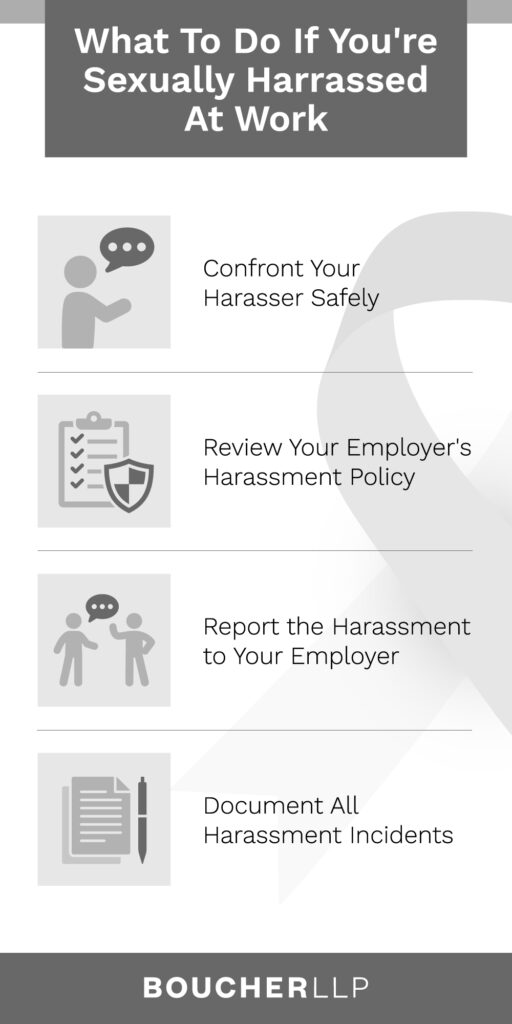Our attorneys focus on holding institutions responsible for allowing abuse to occur. We typically do not handle matters involving abuse by a personal acquaintance, family member, or other individual outside of an organization.
Sexual harassment is a pervasive problem. But taking action to make it stop can be emotionally challenging and nerve-wracking.
In particular, thinking about suing for sexual harassment in the workplace brings up a number of concerns. Will I get fired for complaining? Will my harasser retaliate against me? Will raising this issue at my current workplace make it harder for me to get hired elsewhere?
The attorneys at Boucher LLP understand your concerns and will take the time to answer your questions. We can explain how to file a sexual harassment lawsuit in California. Because we have decades of experience handling harassment and abuse cases, we will help you close this painful chapter in your life and move forward to a brighter future.
If you are wondering how to sue for sexual harassment in California or are ready to take action against your harasser, then contact the sexual harassment attorneys at Boucher LLP today by calling 818-340-5400.
What Is Sexual Harassment?
Sexual harassment is any unwanted visual, verbal, or physical conduct that is sexual in nature. This includes things like pantomiming sexually suggestive gestures, making lewd comments, or touching someone in a sexual manner without consent. Unwelcomed sexual advances and requests for sexual favors are also harassment.
Federal and California law recognize two main types of sexual harassment.
Quid Pro Quo
The term quid pro quo is Latin for “something for something.” In the sexual harassment context, it means the harasser asks for something sexual in exchange for a work benefit (like a better work schedule or a promotion).
It can also be used as a threat—as in “if you don’t give in to my sexual demand, I will get you fired.” Either way, it’s illegal.
Hostile Work Environment
When harassment unreasonably interferes with your work performance or creates an intimidating, hostile, or offensive work environment, it’s also illegal. In this situation, the sexual harassment must be unwelcome by you and also severe or pervasive.
A distasteful or unwelcome joke now and then likely doesn’t qualify. However, frequent explicit comments about how you look, or one incident where a coworker grabs your breast, likely would.
Notably, the behavior doesn’t have to be based on sexual desire, and the harasser can be of any gender. The sexual harassment also can be directed at someone else so long as you witnessed it and were negatively impacted.

Can I Sue My Employer for Sexual Harassment?
Most people know they can sue their harasser for sexual harassment. But what if the harasser is your boss? Can you sue your boss for sexual harassment?
The answer is yes. In fact, when a supervisor harasses you, California law holds your employer strictly liable for your damages.
Can you sue a company for sexual harassment perpetrated by one of its employees? Again, the answer is yes.
You can sue your company if:
- Your supervisor was your harasser or
- You reported harassment by someone else to your company and no one took immediate and appropriate action to correct the situation.
Your company may even be liable if you didn’t report it, but your company knew or should have known you were sexually harassed.

What Should I Do If I Have Been Sexually Harassed at Work?
If someone’s conduct at work crosses the line, you have the power to make it stop.
Confront Your Harasser, If You Can Do So Safely
The first step is to confront your harasser and tell them to stop the harassing conduct. But we understand you might not feel comfortable doing so. That’s okay—you’re under no obligation to confront a harasser.
Review Your Employer’s Sexual Harassment Policy
The next step is to review your employer’s policy handbook, which should contain its sexual harassment policy. Every California company has an affirmative duty to create a workplace environment free from sexual harassment. They must also develop:
- A harassment, discrimination, and retaliation prevention policy and
- A complaint process.
Both must be in writing and distributed to employees.
Report the Harassment to Your Employer
Once you know the policy, report the harassment to a supervisor, human resources person, or whoever is designated via your company’s harassment complaint procedure.
Document, Document, Document
While we understand that this whole process is traumatic, it’s important that you write down everything that happened to you and when it happened. Be sure to include things your harasser said, as well as comments or actions by any witnesses.
If some of the harassment occurred over email, print a copy of the emails.
It’s also important to take notes about to whom you reported the harassment, what they said, and what actions they took. If you filled out a written complaint, be sure to keep a copy.
You should also note the details of any retaliatory actions you experienced, as these also are illegal.
What to Do Before Suing for Sexual Harassment
If your employer was unwilling or unable to correct the problem, it’s time to move on to the next step. Though this can be daunting, you should not have to deal with sexual harassment at work. It’s important to hold your harasser, and the company that allowed this conduct to occur, accountable.
Contact a California Sexual Harassment Attorney
You don’t have to do it alone, though. Reaching out to an experienced California sexual harassment attorney at this stage means you will have someone by your side.
The attorneys at Boucher LLP know what it takes to stand up to harassers and will support and guide you.
File an Administrative Claim
The first step before suing for sexual harassment in California is to file a complaint with the California Department of Fair Employment and Housing (DFEH). DFEH can investigate your claims or issue a right-to-sue notice, which allows you to file a lawsuit in court.
You also have the option to file a charge with the Equal Opportunity Employment Commission (EEOC), but you do not need to file with both agencies. An EEOC complaint may be appropriate if you are a federal employee.
Either way, keep track of the deadlines for filing your sexual harassment claim. If you are at the point of filing an administrative complaint, it is best to have an experienced lawyer help you since the process will go more smoothly if you have someone familiar with the process in your corner.
How to Sue for Sexual Harassment in California
Once you’ve decided that filing a sexual harassment lawsuit is the best way to move forward, your attorney will handle many of the steps. But there still are important things you can do.
Meet with Your Attorney
If you haven’t already, meet with a seasoned sexual harassment attorney. To prepare a complaint and start the discovery process for your case, your attorney will need names, dates, and details related to your sexual harassment claims.
Avoid Posting on Social Media
Though it is brave to share what you are going through, it’s unwise to post about your experience or your case on social media. The other side will read your posts and may use things you say against you.
Also, avoid sharing with friends and loved ones details about your conversations with your lawyer. Disclosing too much may result in you losing the special confidentiality that exists between clients and lawyers.
Review Documents
Throughout the case, your attorney will draft pleadings, motions, and discovery responses. Pleadings are things like your initial complaint and the defendant’s answer. Motions ask the court to rule on disputed issues in the case.
Discovery is the name for the process where each side seeks out the facts of the case. It includes written questions, requests for documents, requests for admissions, and depositions.
Because you know better than anyone what happened to you, it’s important that you carefully review anything your attorney sends to make sure it is accurate. Don’t be intimidated. This is your case.
Think About What’s Most Important to You
The vast majority of civil cases settle before trial. Often this occurs when the parties meet with a judge for a settlement conference or with a private mediator at a mediation. At that time, the judge or mediator will talk to you and your attorneys about what you would need to resolve the case.
The answer is different for everyone, so it’s important to think about what matters the most to you. You may want to be reinstated to your job or to obtain compensation for the emotional distress you suffered. Settlement involves compromise so you need to know your deal-breakers.
Need Help With Your Sexual Harassment Claim? Contact Boucher LLP Today
Stepping up to take back control over your career can be empowering. Boucher LLP attorneys have the experience and understanding to be your advisors and partners in this process.
We have handled many high-profile cases against those who abused power. Let us help you obtain the justice and compensation you deserve. Contact us today to set up a consultation and learn more about how you can sue for sexual harassment in California.